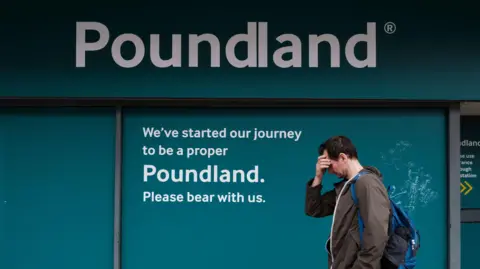Correspondent, BBC News
 Getty Images
Getty ImagesBudget chain Poundland has said it will be closing 68 stores as part of a turnaround plan to revive its fortunes.
A distribution centre at Darton, South Yorkshire and its national distribution centre at Bilston in the West Midlands have also been earmarked for closure in early 2026.
In addition, Poundland is seeking rent reductions from landlords which, together with lease expiries, could result in an additional 70 or so store closures in the future.
Poundland was sold for a pound last week to the US investment firm, Gordon Brothers, after struggling with “challenging trading conditions”.
Poundland currently has 792 stores and employs around 16,000 people.
The restructuring plan still requires approval by a court.
“It’s no secret that we have much work to do to get Poundland back on track,” said Barry Williams, Poundland managing director.
While it was “regrettable” the turnaround plan included closures, he said this was “necessary if we’re to achieve our goal of securing the future of thousands of jobs and hundreds of stores”.
“While Poundland remains a strong brand, serving 20m-plus shoppers each year, our performance for a significant period has fallen short of our high standards and action is needed to enable the business to return to growth.”
Poundland also said it would stop selling frozen food, and instead focus on its £3 meal deal and essential groceries such as milk.
It said its website poundland.co.uk would stop taking online orders and instead switch to browsing and branding, or advertising promotions, instead.
The chain also said it would add a “greater depth of womenswear in its clothing offer, the return of key seasonal general merchandise ranges and the restoration of product categories customers have missed”.
Poundland’s former owner, Polish firm Pepco, confirmed last week that it had sold the brand for a “nominal” sum to Gordon Brothers, a global investment firm which formerly owned fashion label Laura Ashley.
Pepco had owned Poundland since 2016, but sales at the chain have been struggling. Pepco had also warned that the increased employer National Insurance contributions which began in April would add to pressure on the chain.


